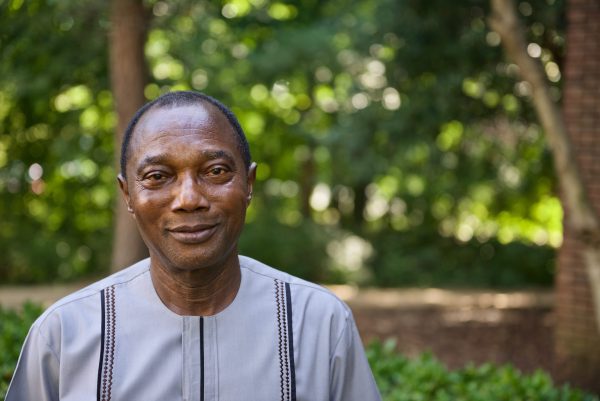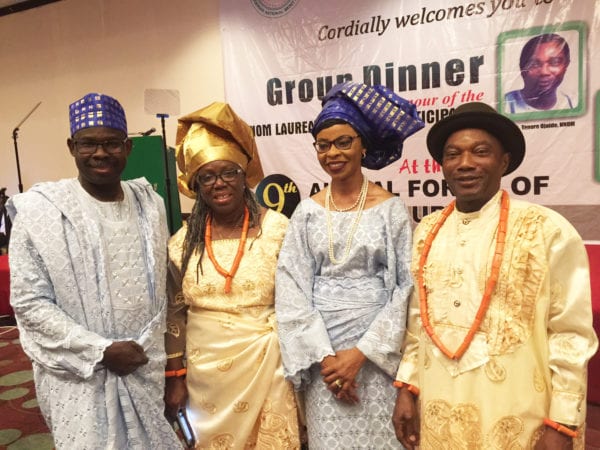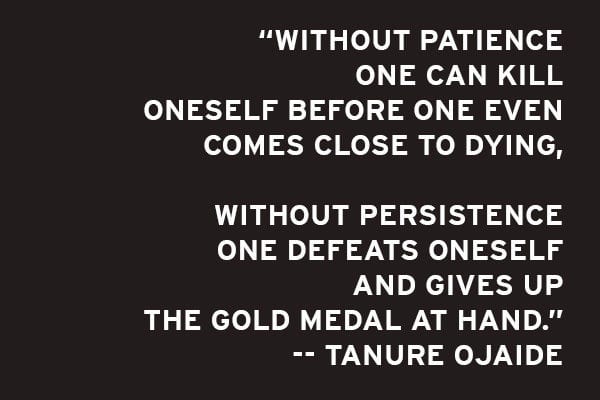Heart and Home: Writer Challenges, Inspires With His Words

In his 2017 memoir At Home, Away From Home, UNC Charlotte’s Tanure Ojaide speaks of the indelible impressions from his early years in Nigeria. In his words, “One does not forget what one yearns for at heart.”
At age 70, Ojaide has long turned to his Niger Delta homeland for reflection and inspiration. As a boy living with his grandmother in a quiet rural area, he saw how oil exploitation polluted the land and rivers while leaving the people impoverished. Many of his poems, short stories, critical essays, and books serve as activist works calling out for justice and fairness for the people and the ecosystem of the Niger Delta.
“Tanure is the most prolific and most decorated faculty poet in the UNC system, and one of the leading African writers of our time,” says Akin Ogundiran, chair of the Africana Studies Department. “Yet, this literary giant has an unassuming personality. Many people on campus would not know that Ojaide is one of the pioneers of what we now call environmental literature or eco-criticism.”
Before these terms came to be widely used, Ojaide had already created a large body of literary works on the issues of environmental justice, Ogundiran says.
“Writing on the experiences of the people of the Niger Delta in Nigeria, his place of birth, he is among the first writers to bring the attention of the world to the massive environmental degradation and the untold hardship caused by the decades of oil drilling in the region, international corporate greed, and an inept and corrupt state structure,” Ogundiran says.
Ojaide has won more than a dozen book prizes and accolades, including the Commonwealth Poetry Prize, Cadbury Poetry Prize, and the Association of Nigerian Authors’ Poetry Award. He received UNC Charlotte’s First Citizens Bank Scholar Medal Award in 2005, and was named the Frank Porter Graham Professor of Africana Studies in 2006. He has received two Fulbright fellowships.

Ojaide (right) at awards ceremony.
In 2016, he was decorated with Nigeria’s highest academic honor, the Nigerian National Order of Merit, and received the African Literature Association’s Fonlon-Nichols Award in recognition of his scholarly contributions to democratic ideals, humanistic values, and literary excellence in Africa. Three celebrations honoring his life’s work have been held this year.
Ojaide joined the UNC Charlotte faculty in 1990 after teaching at The University of Maiduguri in Nigeria. The impact of his creative and scholarly works on the Department of Africana Studies and other academic programs at UNC Charlotte has been significant, Ogundiran says.
“His body of works on environmental justice influenced our department’s decision six years ago to develop the concentration in health and environment within the Africana Studies major,” he says. “His books and teaching have also been the gateway for students to enter the world of environmental justice and environmental activism.”
Much like his travels between his physical homelands, Ojaide’s writing moves between traditions. His style is inspired by his people’s oral storytelling and performance traditions and also draws from his formal studies of Western literature as an undergraduate at the University of Ibadan and as a graduate student at Syracuse University, where he earned a master’s degree in creative writing and a doctoral degree in English.
“African literature, from the oral tradition, tends to be functional,” he says. “You tend to use it to fight your own issues towards resolution, in a way. My Urhobo people have an oral poetic performance genre, Udje.” Udje is employed satirically to expose vices and minor crimes and to communicate societal expectations. He received a National Endowment for the Humanities fellowship to collect and study the Udje dance songs of the Urhobo people.
“Above all I am a poet, and I have tried to use the tools of the indigenous tradition to bring something new into English, especially the performance tradition of the Urhobo people of the Niger Delta,” Ojaide says. “My own environment has fed me, given me the materials with which really to express myself.”
As a younger man, in his mind and in his writing, he blamed others for his country’s troubles.
“That’s an area where I may have matured,” he says. “I used to blame the colonialists for everything. Now I blame more of the national leaders because you get to a stage where you have to stop blaming others and put your destiny in your own hands. I look at things in a more holistic way. As you grow older, I think you become more understanding of why things are what they are. The younger persons are more impatient and angry. Not that I’m no longer impatient and angry, but not in the same way. I understand more why things are how they are.”
 While much of Ojaide’s work relates to environmental issues, he also addresses topics including gender and women’s issues, sexuality, equity, race, and identity.
While much of Ojaide’s work relates to environmental issues, he also addresses topics including gender and women’s issues, sexuality, equity, race, and identity.
He writes by hand first, often jotting notes in a journal. He has filled over 30 journals since a former student who now is at Brown University gave him the first one.
“The inspiration can come only once,” he says. “If you leave it, it will go. When it comes you just have to capture the thoughts at that time. If you don’t do that, you lose them. When inspiration comes, there are different processes. Sometimes inspiration comes almost whole. Sometimes the beginning of the poem comes in.”
At times, it can take days, weeks or even months for the remainder of the poem to form. “You don’t really control it, but somehow it evolves to be something,” he says. “Sometimes you may have a sense of something, and then it comes, and you try to capture it.”
His teaching and research live in harmony with his writing.
“There’s a symbiotic relationship between teaching, research, and my creative writing,” he says. “How can you teach well if you don’t read, if you don’t do research and write?” With his readings and research in British, American, Greek, Russian, Caribbean and other literatures, he can infuse comparative readings in his classes.
Ojaide is sure his best work is yet to come. “I still feel I could do better,” he says. “Of course every writer is ambitious to be taken seriously by people who look at literature. I still feel with what I have coming, with a new collection of poetry, that I will still try to distill my thoughts in a way to where people feel that, ‘Yes, we have a poet here who has really been able to express the realities of a people in a most poetic way.’ ”
Words: Lynn Roberson, CLAS Communications Director | Images: Lynn Roberson and courtesy of Ojaide | Ojaide’s poems are reprinted with his permission.
Still Waiting
This thing called patience is so persistent.
Not just a crocodile waiting for a catch
at the water’s edge. It is hope that another
season will prevail and the hurt of today
will intensify into copious tears of happiness,
that there’s ample time in sickness to recover
from death and that every distance collapses
with a transporting spell. It cannot be far away
that there in the dungeon of darkness
day will surely break even if stealthily;
the cripple can grow wings that nobody sees
and prophecy transforms fears into smiles.
Still waiting further from the ogre
nobody appears to calm the nerves
but that thing called persistence
carries you so far from one point
into freedom; patience accompanies till
arrival at the horizon over the crossroads.
Without patience one can kill oneself
before one even comes close to dying,
without persistence one defeats oneself
and gives up the gold medal at hand.
After sacrifice you wait for the response
of the divine and how long it takes
if gods are hard of hearing as many are
will be another matter not to worry about.
Patience can blow away obsidian clouds
and place the sun on an outstretched palm.
The sun is up; there will be another day.
I am still waiting. Waiting and waiting.
My Island
My island is a world away from others
but I cannot sleep in the night of my comfort
because under the penetrating chatter of other islanders
whose halogen-lit boats cruise through my backyard.
At daytime my boats fill with fighters and prayers
that I am sending to distant islands without quays;
locked mansions without keys to enjoy affluence.
I cannot have peace when others are facing riots
for doing the right things prescribed in the books.
The revolution in my hands raises bright flags;
others invade my summer moon to avoid solitude.
Nobody wants to condemn himself to depression,
if he can avoid complaining without being heard;
nobody chooses to lose his aces in the competition.
My island is a world away from others but I struggle
to keep from drowning in the tsunami of their cries;
I hold to anything in the hysteria that has gripped me.
My island runs the risk of evaporating if the world
I don’t see as the same as mine weighs it down to save
itself from going under as everyone presses others down.
I am no uhovwe wood floating under any weight;
the loads of others have exacerbated our personal ones.
“I have nowhere else to go for relief than only yours!”
The hemispheres are coming together in my island
I had thought worlds away from the desires of others.
What I see from a distance takes place in other islands;
every island is under pressure in the storm watch alert.
I have slept soundly in the peace of others far away;
I have kept vigil in the demise of folks I didn’t know.
I can’t deny that everybody far or near is a relative.
I no longer seek comfort or security from the fact that
my island is quite a troubled world away from others.